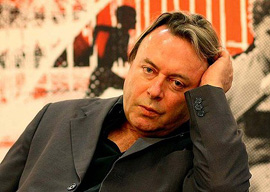
December 21, 2011

Christopher Hitchens
There wouldn’t seem to be much left to say about the late Christopher Hitchens after the countless tributes paid by other journalists about the night (or afternoon or morning) they got drunk with Hitch. Still, I want to call admiring attention to his taste in English literature.
Unable to boast of having downed a few with Hitchens myself, I tended to find much of his voluminous output over the last decade reminiscent of the legendary Private Eye reporter Phil Space. Yet in at least one venue, Hitchens demonstrated distinction. Just before 9/11, Benjamin Schwarz hired Hitchens to write a long monthly literary column for The Atlantic that showcased Hitchens’s combination of panache, pedantry, and lifelong conservatism.
The first four authors Hitchens profiled for The Atlantic were Anthony Powell, Winston Churchill, Kingsley Amis, and Rudyard Kipling: all of them English, right-of-center, and connected.
Hitchens never seems to have quoted Sovietologist Robert Conquest’s famous line, “Everyone is conservative about what he knows best,” but he did write about the author of The Great Terror: Conquest was a close associate of the father of Hitchens’s friend Martin Amis. (Kingsley Amis once proposed that a post-1989 edition of Conquest’s Great Terror be retitled How About I Told You So, You F****** Fools?)
Conquest’s law of conservatism is the kind of omission that Hitchens would have considered telling. Indeed, he argued in The Atlantic that you could be sure P. G. Wodehouse was influenced by Oscar Wilde’s The Importance of Being Earnest because Wodehouse never mentioned that famous play, only to be disappointed when a reader pointed out to Hitchens that Wodehouse had.
While Hitchens’s notions on many subjects appeared to have been made up off the top of his head (Trotskyism! Islamofascism! Invade Iraq!), his favorite writers were sound as a pound. Hitchens affected being a man of the left, but he was one of nature’s Tories. His mother saw to the nurture. When his father fretted about public-school tuition, she declared, “If there is going to be an upper class in this country, then Christopher is going to be in it.”